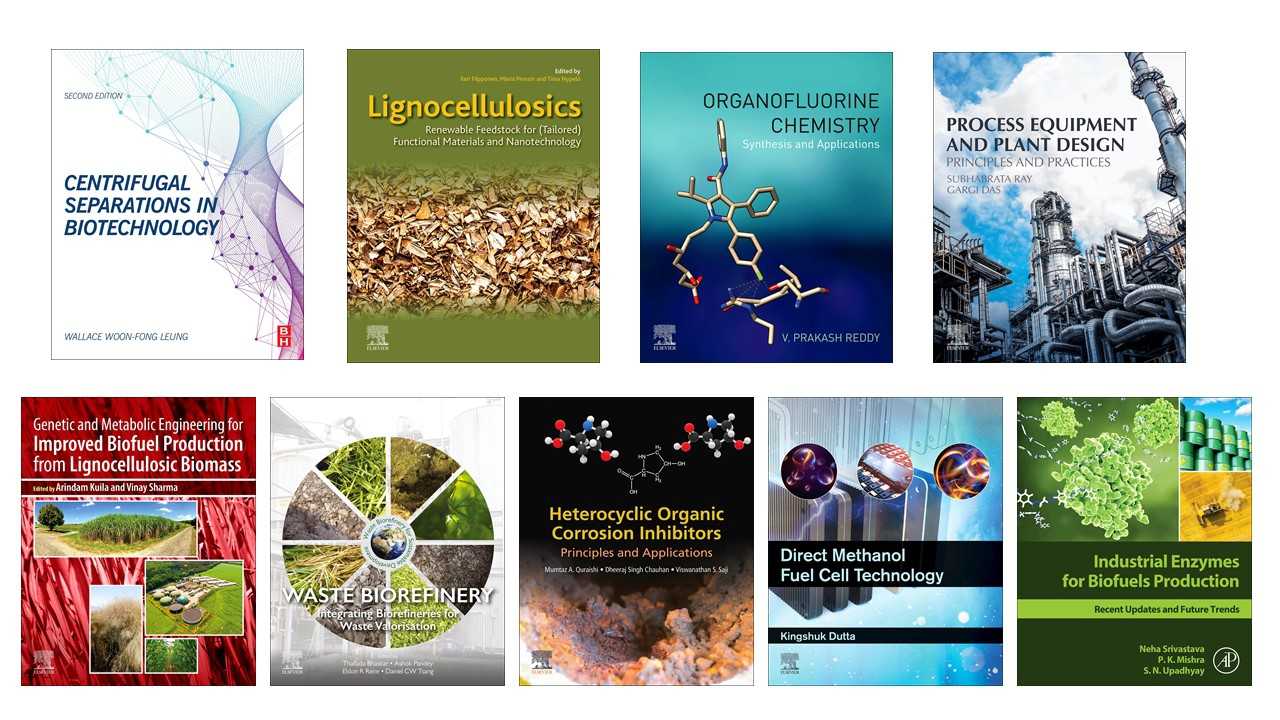Nine new Books from Elsevier about Chemical Engineering and Plant Design

Elsevier announced the publication of niie new books in the area of Chemical Engineering and Plant Design.
Centrifugal Separations in Biotechnology, Second Edition
by Wallace Woon-Fong Leung
This new edition is the only book on the market devoted to centrifugal separation in biotechnology. Key topics covered include a full introduction to centrifugation, sedimentation, and separation; detailed coverage of centrifuge types, including batch and semi-batch centrifuges, disk-stack and tubular decanter centrifuges; methods for increasing solids concentration; laboratory and pilot testing of centrifuges; selection and sizing centrifuges; scale-up of equipment, performance prediction and analysis of test results using numerical simulation. This title provides guidance on troubleshooting and optimizing centrifuges, and then goes on to explore the commercial applications of centrifuges in biotechnology.
Process Equipment and Plant Design: Principles and Practices
by Subhabrata Ray and Gargi Das
This book takes a holistic approach towards process design in the chemical engineering industry, dealing with the design of individual process equipment and its configuration as a complete functional system. Chapters cover typical heat and mass transfer systems and equipment included in a chemical engineering curricula, such as heat exchangers, heat exchanger networks, evaporators, distillation, absorption, adsorption, reactors, and more. The authors expand on additional topics such as industrial cooling systems, extraction, and topics on process utilities, piping, and hydraulics, including instrumentation, and safety basics that supplement the equipment design procedure and help to arrive at a complete plant design.
Organofluorine Chemistry: Synthesis and Applications
by V. Prakash Reddy
This book gives a comprehensive outlook on modern synthetic methodologies for organofluorine compounds. It illustrates chemical, biochemical, and materials applications of fluorine-containing compounds, including synthesis and applications of small molecules, compounds in drug discovery, positron emission tomography, and fluorinated polymers in solar cells. This book is of use to scientists working in the interdisciplinary areas, such as chemical, biochemical, and biomedical engineering, as well as those involved in materials science and medicinal chemistry. It is also a useful reference for researchers and graduate students interested in organofluorine chemistry.
Direct Methanol Fuel Cell Technology
by Kingshuk Dutta
This book presents the overall progress witnessed in the field of DMFC over the past decade, highlighting the components, materials, functions, properties and features, designs and configurations, operations, modeling, applications, pros and cons, social, political, and market penetration, economics, and future directions. The book discusses every single aspect of DMFC device technology, the associated advantages and drawbacks of state-of-the-art materials and design, market opportunities and commercialization aspects, and possible future directions of research and development. The book, containing critical analyses and opinions from experts around the world, will garner considerable interest among actual users/scientists/experts.
Heterocyclic Organic Corrosion Inhibitors: Principles and Application
by Mumtaz A. Quraishi, Dheeraj S. Chauhan and Viswanathan S. Saji
This book aims to comprehend the synthesis and application of organic heterocyclic compounds as corrosion inhibitors in various corrosive environments. Considering the high importance of corrosion inhibitor development for different industries, the book provides the fundamentals and most recent advancements in this field. The book is an indispensable reference tool for industrialists and academicians working in the field of corrosion protection. This book also provides a systematic overview of fundamentals and current advancements.
Waste Biorefinery: Integrating Biorefineries for Waste Valorisation
by Thallada Bhaskar, Ashok Pandey, Eldon Rene and Daniel C.W. Tsang
This book provides the various options available for several renewable waste streams. The book includes scientific and technical information pertaining to the most advanced and innovative processing technologies used for the conversion of biogenic waste to biofuels, energy products, and biochemicals. In addition, the book reports on recent developments and new achievements in the field of biochemical and thermo-chemical methods and the necessities and potential generated by different kinds of biomass in presumably more decentralized biorefineries.
Industrial Enzymes for Biofuels Production: Recent Updates and Future Trends
by Neha Srivastava, P.K. Mishra and S. N. Upadhyay
This book focuses on resolving existing bottlenecks in enzymes mediated biomass to biofuels production processes by updating recent scientific knowledge and technology developments. The book provides low-cost sustainable approaches to lower the cost of enzymes production following different approaches. It is specifically focused on industrial aspects of enzymes used in biofuels production processes by presenting an in-depth study of existing issues related to practical viability and long-term sustainability. The book covers detailed discussions on the market scenario of industrial enzymes used in biofuels production processes and compares them on both lab and industrial scale.
Lignocellulosics: Renewable Feedstock for (Tailored) Functional Materials and Nanotechnology
by Ilari Filpponen, Maria Peresin and Tiina Nypelö
This book gives a comprehensive overview of recent advances in using lignocellulosic substrates in materials science and nanotechnology. The functionalization and processing of lignocellulosics are described via a number of examples that cover films, gels, sensors, pharmaceutics, and energy storage. In addition to the research related to functional cellulose nanomaterials, there has been an increased interest in research on lignin and lignocellulosics. This book explains how utilizing biomaterials as a raw material allows the ambitious reconstruction of smart materials that are green and multifunctional.
Genetic and Metabolic Engineering for Improved Biofuel Production from Lignocellulosic Biomass
by Arindam Kuila and Vinay Sharma
This book describes the different aspects of biofuel production from lignocellulosic biomass. Each chapter presents different technological approaches for cost-effective liquid biofuel production from agro-residues/biomass. Two chapters cover future direction and the possibilities of biomass-based biofuel production at the industrial level. The book provides a genetic and metabolic engineering approach for improved cellulase production and the potential of strains that can ferment both pentose and hexose sugars. The book also gives direction on how to overcome challenges for the further advancement of lignocellulosic biomass-based biofuel production.



















